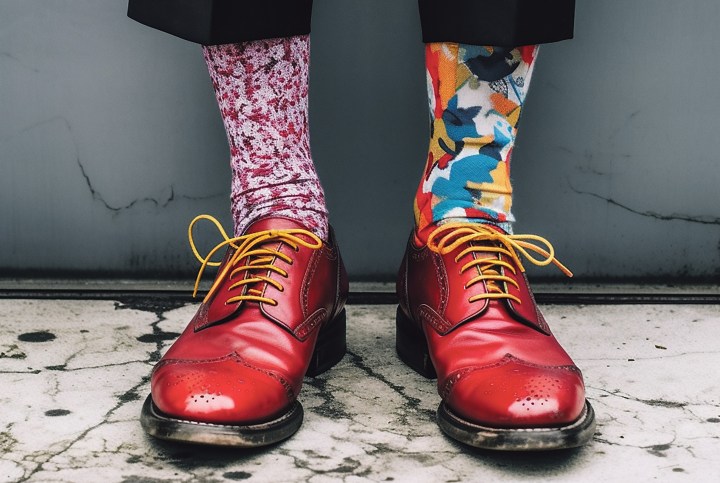MENTAL HEALTH
The art of wearing funky, odd socks to make healthcare profressionals more aware about depression and suicide

CrazySocks4Docs is an Australian mental health awareness campaign that has spread across the world, including to SA. It’s not a moment too soon.
Donning mismatched or funky socks to raise awareness of mental illness among healthcare workers across the world may seem relatively odd.
Yet healthcare professionals in different medical fields the world over have embraced the “odd socks movement” by wearing the funniest, brightest or most peculiar pairings of socks to highlight an alarming increase in depression and suicide among them – as well as those in training.
On the first Friday of June, many countries – including Australia, the US and South Africa – observed CrazySocks4Docs Day (CS4D) to raise awareness about mental illness among healthcare workers, with a particular focus on removing the stigma associated with it.
Similar to the 10-year-old Lots of Socks campaign, which takes place on World Down Syndrome Day, 21 March, the CrazySocks4Docs initiative uses socks – a relatively visible item of clothing – to signify support for a growing challenge: mental illness stigmatisation of healthcare workers in particular.
Dr Geoffrey Toogood
The CrazySocks4Docs initiative was established in 2017 by Australian cardiologist Dr Geoffrey Toogood, who accidentally showed up to work wearing a pair of mismatched socks.
This set off the workplace gossip mill, with colleagues questioning his mental state. Toogood, who lived with depression and anxiety and faced stigma and discrimination on many levels, was determined to turn this moment around.
“It’s okay not to be okay. All I want is for healthcare workers the world over to realise that, and to take action so they can return to a state of wellness,” said Toogood.
In a recent interview with Dr Yumiko Kadota on the podcast Junior Doctor’s Corner, Toogood related how his idea of wearing odd socks to start a conversation about mental health, which was taboo for a long time, came about. “I had earned some stripes in the medical field and felt a responsibility toward the many generations of healthcare workers who were just entering the field,” he said.
“What we’ve found is that this awareness drive drew responses from first responders [paramedics], nurses and every other kind of healthcare worker … all because we’ve started signalling our support for people going through what may possibly be the most difficult time in their lives through wearing different, odd or bright socks.”
Feeling it in training too
Studies from different parts of the world show that certain types of mental illnesses are on the rise, specifically among individuals working in the healthcare sector.
Researchers have started turning their attention to students currently studying toward a healthcare qualification at medicine and health sciences institutions across the world, with the objective of finding out the prevalence of depression and/or suicide ideation among healthcare workers in training.
In 2022, a study in Bangladesh revealed that depression was prevalent in 58.6% of medicine and health sciences students. The prevalence of suicidal ideation was found in 27.4% of this student population, which is higher than the global prevalence rate of 14%.
In China, a study conducted nearly a decade ago showed that a mean prevalence of depression was 32.74% among medical students, whereas the mean prevalence of anxiety was 27.22%.
In 2022, a study conducted in the US, which surveyed medicine and health sciences students at 145 different institutions across the country, found that nearly 50% (48.6%) were at risk of developing depression, with 61% of first-year students at risk.
The South African scenario is not too dissimilar. In 2019, a few months before the start of the Covid-19 pandemic, one in every four health sciences students at the University of Cape Town reported a depression or anxiety diagnosis and used psychotropic medication.
The researchers claimed this was significantly more than age-based expectations. Even more students screened positive for risk of depression or anxiety disorders.
Showing solidarity
Recent research shows burnout tends to start in medical or health sciences training. In South Africa, the significant academic workload, long hours and stress of often caring for patients in resource-constrained environments has been proven to take its toll.
Over the course of the past four years, the Ithemba Foundation, a nonprofit entity with the public benefit goals of raising awareness of depression and related diseases as biological illnesses, has brought the CrazySocks4Docs campaign to medicine and health sciences institutions in South Africa.
The foundation has been encouraging healthcare workers in training – and those working in healthcare spaces – to wear silly socks, speak up about their mental health challenges and spread the word on social media.
It has urged South Africans – and healthcare workers in particular – to don bright, colourful or mismatched socks as a way of recognising and paying tribute to healthcare workers for the invaluable role they play in South Africa. DM
Florence de Vries is a communications specialist and journalist whose primary research interests are in the fields of mental health and the ethics of care.
This story first appeared in our weekly Daily Maverick 168 newspaper, which is available countrywide for R29.



















Comments - Please login in order to comment.